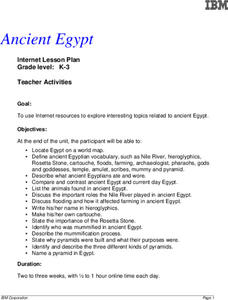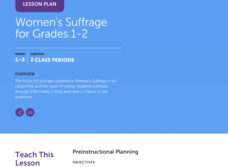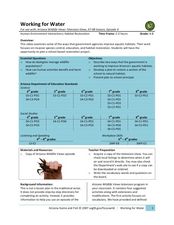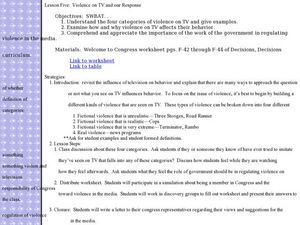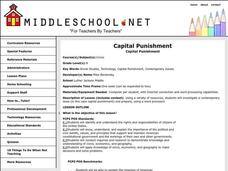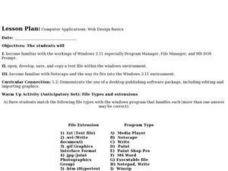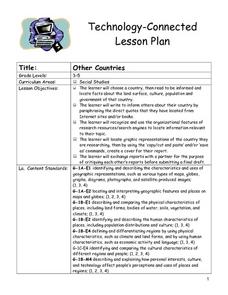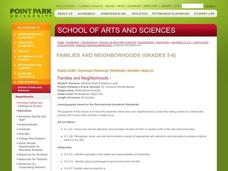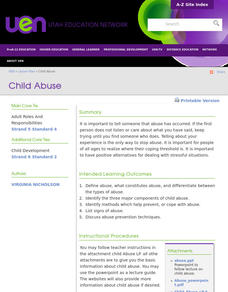Curated OER
Ancient Egypt
Students use the internet to research topics on Ancient Egypt. They practice using new vocabulary and identify the types of food they ate and clothing they wore. They explain the role of the Nile as well.
Curated OER
Cultures Around the World
Learners examine the types of celebrations around the world. They create pictures of animals speaking another language than their own and draw flags of countries around the world. They also retell a folktale to their classmates.
Scholastic
Women's Suffrage for Grades 1–2
Scholars take part in a grand conversation after they examine facts and stories about the Women's Suffrage Movement. Eight discussion questions bring light to influential women, the importance of voting, citizenship, and voting rights.
Curated OER
Comparison of Economic Systems
Here is a worksheet in which learners identify and compare economic systems (market, command, mixed, etc.) with 18 fill-in-the-blank questions and a graphic organizer.
Curated OER
Heat and Color
Sixth graders conduct a simple experiment to explore the ways that color can affect heat transfer. They review the three ways that heat can transfer: conduction, convection and radiation.
Curated OER
Development, Trade, Aid
Twelfth graders study the term development. In this Economics lesson, 12th graders explore the role of trade in stimulating development, with particular focus on the role played by the British Government. Students decide how aid...
Curated OER
Working for Water
Students examine the ways that government works to help improve aquatic habitats. In this water habitats lesson students view a video and plan a school restoration project.
Curated OER
Economies
Learners discover different economic systems. In this global economy lesson, students research the levels of economic activity, types of economies, maquiladoras and the differences between a free market economy and other systems. This...
Curated OER
Violence on TV and Our Response
Students examine violence on television. In this media awareness lesson, students discuss the types of fictional and realistic violence shown on American television. Students participate in a Congressional simulation activity on the...
Curated OER
Capital Punishment
Eighth graders research capital punishment and then type a six paragraph paper.
Curated OER
Teaching About East Asia
Seventh graders research East Asian countries. In groups, pupils are assigned to research China, Japan or Korea. Using the internet and other resources, classmates create a multiple tier time line. They consider aspects such as...
Curated OER
#1 Air Module Scenario
Students are a small environmental consulting firm. This type of company is hired by companies and government agencies to do research into environmental issues and impacts. Students first task is that concerned parents related to their...
Curated OER
Language Arts: Two Specific Documents
Students are able to read and analyze the essential parts of two specific types of documents, the informed consent document and the position paper, used by scientists to communicate information about their research to two different kinds...
Curated OER
LESSON PLAN: CONTROLLING NUCLEAR WEAPONS: DEBATING THE NON-PROLIFERATION TREATY
Ninth graders examine various nuclear weapons. In this American Government instructional activity, 9th graders conduct primary source research to investigate nuclear weapons and the international nuclear Nonproliferation Treaty. Students...
Curated OER
Computer Applications: Web Design Basics
High schoolers become familiar with the workings of Windows 3.11 especially Program Manager, File Manager, and MS DOS Prompt. They open, develop, save, and copy a text file within the windows environment. They become familiar with...
Curated OER
Fabric Construction Chart
Students in sewing class review the various types of natural and synthetic fabrics. They take notes about fabric construction and match woven, knit, and non-woven fabric samples to fabric construction charts. They make specific...
Curated OER
Classifying Monocot And Dicot Plants
Sixth graders identify the parts of a flower, and tell the difference between monocots and dicots. They group plant by leaf types and characteristics placing the information in table form on the computer.
Curated OER
Other Countries
Students select a country and conduct research on the culture, population, geography, and government of their country. They conduct research using the Internet and a variety of resource books, and write and publish a report that...
Curated OER
Families and Neighborhoods
Students build their own neighborhood. In this instructional activity on community, students are introduced to books about families and neighborhoods. As a class, the students create their own neighborhood, elect a leader for their...
Curated OER
Pecan Lessons
Students complete lessons on the computer related to pecans. Students complete assignments such as typing descriptions of pecan categories, using email to find out information, researching the internet about production regions, and more.
Curated OER
Child Abuse
Students define abuse, and identify the three major components of child abuse. They identify methods that help prevent, or cope with abuse, and prevention techniques.
Curated OER
Human Trafficking & Modern Day Slavery - Laws & Conventions
Students are introduced to the topic of human trafficking. They identify the reasons why people are trafficked and the laws and conventions around the globe that punish this type of behavior. Using the internet, they describe how the...
Curated OER
Shopping for Souvenirs In the Middle East
Students participate in a role play in which they are shopping for souvenirs in the Middle East. Using maps, they locate the Middle East and identify each country within the region. They create a key map for the types of souvenirs that...
Curated OER
Simple Machines
Third graders are introduced to the six types of simple machines and discover how they make tasks easier. In groups, they rotate between stations to experiment with the different types of simple machines. To end the lesson, they make a...


